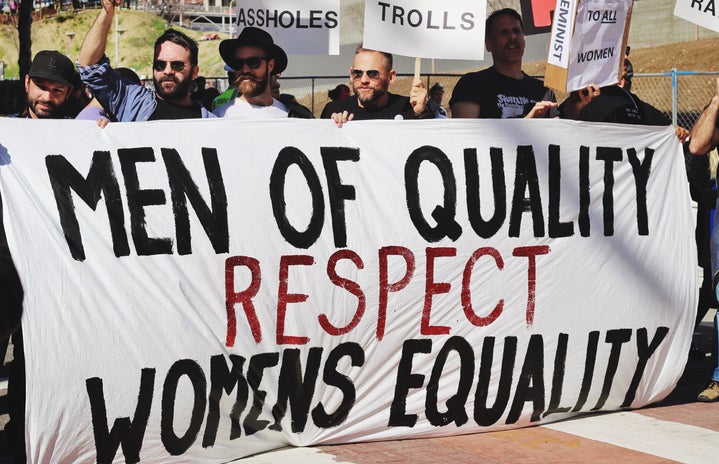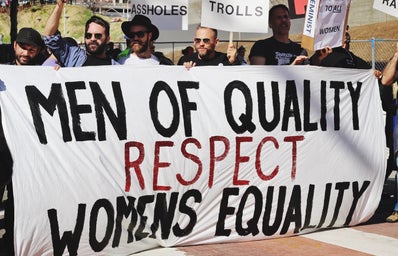You’d have to be living under a rock to not know the “Try Guy” drama that’s occurred in the past couple of months. Nay, you’d have to be living under an ingrown hair that’s been festering and growing on an old man’s back for twenty years to have not heard about it.
Everyone, or at least a majority of the internet, is shocked about how Ned Fulmer, a self-proclaimed “wife guy”, who has created a brand out of loving his wife, has cheated with an employee of his company. Again, I’m not going to go into the gritty details of this scandal, because it’s literally all over the internet.
I and others are starting to notice a pattern of famous men who brand themselves as “the wife guy” turning out to be actual pieces of sh*t. Shane Carl, John Mulaney, and Adam Levine are all known examples of men who used to be “so cute” and “the perfect man” towards their partners, only to be exposed for infidelity in the most humiliating way possible for themselves, their wives, and any children involved.
So, it is a brave new world we live in: heterosexual relationships used to come with the fear of misogyny, sexism, and infidelity, and for a while, we thought this issue was resolved or resolving. With characters like John Mulaney talking about how much he loved his wife every chance he could, how could it not be? It’s in to love your wife, guys.
Unfortunately, the misogyny, sexism, and infidelity that seems so contradictory with the “wife guy” trope are still there–it’s just thinly veiled under cheesy Instagram posts and self-deprecatory jokes about how Ned Fulmer’s, or John Mulaney’s wife, is so out of their league. News Flash, men: publicly mirroring the ideal partner doesn’t make you untouchable, or protected from the wrath of the public eye by any means.
The Financial
Ned Fulmer has made an exorbitant amount of money from being the “wife guy”.
His current net worth, according to multiple sources, is around $10 million. This is around $8 million more than the next richest Try Guy, Zach Kornfield.
Both of the projects that financial sites attribute this difference in income to are due to his wife Ariel. His “Try DIY” show started with Ariel. He authored a cookbook. With Ariel.
Let’s face it, the most interesting thing about Ned Fulmer was Ariel. She was his brand, his “thing”. She is the only reason he faced much success or any attention in the Try Guys.
The branding of the “wife guy” hasn’t only worked on Fulmer. Some of John Mulaney’s most famous jokes stem from his loving his wife (which now are viewed as pretty anti-Semitic, check out this article about it). Until he cheated on her and had a child with another woman.
When told by his wife, Anna Marie Tendler, that he could tell jokes about her as long as he didn’t call her a b*tch and that he didn’t like her. To which he responded, “the bar is so much lower than I ever could imagine”. Which, is a valid point. Until he cheated on her and had a child with another woman.
There’s an article out there, “The Best Part of John Mulaney’s Stand-Up is His Jewish Wife Jokes” that aged horribly. But, it shows how marketable these men became once they seemed like “the good guys” to women. Their marketing tactics are trying to be like the “nice guy” trope, which has finally fallen from grace into the pits of shame and misogyny, but on steroids and with millions of dollars involved. Simply put, it doesn’t take an economist to see why some men may see this marketing choice as the way to go, especially when building a platform.
But, there are still some reasons that the “wife guy” phenomenon has become one of my least favorite pop culture trends out there.
The Historical
Average men have been romanticized and placed on a pedestal for a very long time.
Social media still places a lot of pressure on men to be gentlemen, and it’s pretty often that we see nostalgic posts about men in the 1950s opening car doors for women, bringing them flowers, et cetera.
“You’ll never get a guy to be romantic like that anymore!”
“They just don’t make them like that anymore…”
“The modern age has ruined romance!”
Another news flash: the 1950s-60s era of classical romance gets a lot less desirable when you remember that there are not a lot of truly valuable statistics on domestic abuse rates during those decades. Why, do you ask? Because in the age of men being “gentlemen”, paying for dates, and kissing you goodnight on your doorstep, domestic abuse was so accepted it wasn’t even considered a crime.
Why have we constantly idolized men who put on a display of the doting, romantic partner, but are incredibly toxic behind the scenes?
Why do we still do so? I’m not sure myself, but I do know that the “wife guy” is just the same crummy, scummy man, who only puts on a show of *caring about women* to get positive attention and funding, in a modern package.
The Psychological
The reason the public is so shocked about these cheating scandals isn’t that cheating is shunned in current mainstream American society. In fact, the recent SNL skit about the Ned Fulmer scandal makes it very clear that if anything, cheating is very much excused in this day and age.
It’s not the woman being betrayed in these relationships that garners so much attention. Rather, it’s the betrayal to the public. As onlookers, we don’t understand that the role of the attentive husband is just for show until it’s too late. Unfortunately, it is too often just for show.
Besides the financial benefits of being the “wife guy” as discussed above, the psychological payoff also is insane. I’m no psychologist, but I do understand social media, and it’s no secret that positive attention on any platform is addictive. Honestly, the psychological implications of the “wife guy” sickens me the most.
Being told your relationship is “goals”, that you’re the role model for so many boyfriends and husbands, and that you’re a genuinely good guy is addictive. Especially if you know deep down that it’s not actually true.
Making connections on social media, whether it be from commenters praising your relationship skills or people reposting pictures of you as “the ideal man” give you a release of dopamine that becomes harder and harder to replicate.
Of course, you’re going to chase after that rush by continuing to put on a show–this happens to everyone on social media. But, if you’re a wife guy, you’re getting that rush off because you’re marketing your relationship and your wife. As if she, a living and breathing person, is nothing more than a part of your brand. An anecdote, a joke, or something to sell on merch.
And really, what are we doing praising these men in the first place? Being a loving partner should be the bare minimum. You never would see a female public figure gaining attention by talking about how much she loves her husband. Ever.
Even some of the acts these men put on to gain this praise are, arguably, below minimum standards for a loving partner. Ned Fulmer, for example, always referred to Ariel Fulmer as “my wife” in Try Guy videos. At first glance, this is cute. Take a second look, and compare this with Try Guy Keith Habersberger’s constant referral to his wife by her actual name, and it becomes so clear that Ned prioritized the brand over the person. Ariel Fulmer is a well-known name in the Try Guys community–especially since she makes her own content and is an employee of the company. There’s no need for Ned to only call her “my wife” and only “my wife”–That is, unless “my wife” is a more possessive and marketable title for him.
I pray that the fall of Ned Fulmer is the final fall of the “wife guy”, although I’m not so sure it will be.
He was caught doing a PR walk days after the scandal broke, which makes it seem like he still has a presence to salvage. As if he will have anything to build a platform on without his “wife guy” image.
We’ll have to see what image men start to meticulously craft in order to appear like a good person, rather than putting in the effort to actually be one. I don’t doubt we’ll have another trope soon. But for now, a word of advice for those in heterosexual relationships: If your man is starting to sound like a “wife guy”, run.


